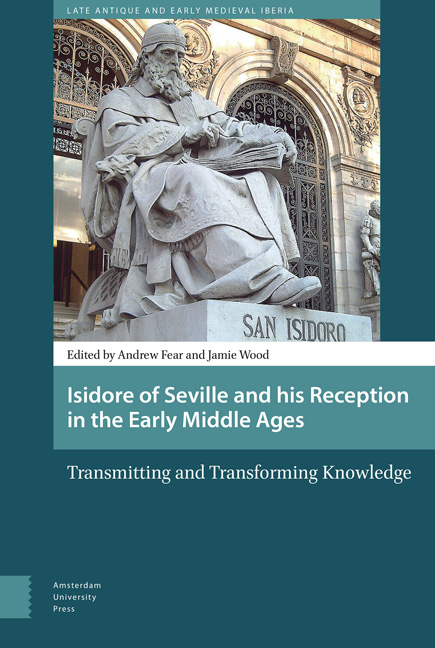 Isidore of Seville and his Reception in the Early Middle Ages
Isidore of Seville and his Reception in the Early Middle Ages Book contents
- Frontmatter
- Contents
- Preface: Paul Fouracre, University of Manchester
- 1 Introduction
- 2 A Family Affair: Leander, Isidore and the Legacy of Gregory the Great in Spain
- 3 Variations on a Theme: Isidore and Pliny on Human and Human-Instigated Anomaly
- 4 Putting the Pieces Back Together: Isidore and De Natura Rerum
- 5 The Politics of History-Writing: Problematizing the Historiographical Origins of Isidore of Seville in Early Medieval Hispania
- 6 Isidorian Texts in Seventh-Century Ireland
- 7 Isidore of Seville in Anglo-Saxon England: The Synonyma as a Source of Felix’s Vita S. Guthlaci
- 8 Hispania et Italia: Paul the Deacon, Isidore, and the Lombards
- 9 Rylands MS Latin 12: A Carolingian Example of Isidore’s Reception into the Patristic Canon
- 10 Adoption, Adaptation, & Authority: The Use of Isidore in the Opus Caroli
- Abbreviations
- Index
9 - Rylands MS Latin 12: A Carolingian Example of Isidore’s Reception into the Patristic Canon
Published online by Cambridge University Press: 12 December 2020
- Frontmatter
- Contents
- Preface: Paul Fouracre, University of Manchester
- 1 Introduction
- 2 A Family Affair: Leander, Isidore and the Legacy of Gregory the Great in Spain
- 3 Variations on a Theme: Isidore and Pliny on Human and Human-Instigated Anomaly
- 4 Putting the Pieces Back Together: Isidore and De Natura Rerum
- 5 The Politics of History-Writing: Problematizing the Historiographical Origins of Isidore of Seville in Early Medieval Hispania
- 6 Isidorian Texts in Seventh-Century Ireland
- 7 Isidore of Seville in Anglo-Saxon England: The Synonyma as a Source of Felix’s Vita S. Guthlaci
- 8 Hispania et Italia: Paul the Deacon, Isidore, and the Lombards
- 9 Rylands MS Latin 12: A Carolingian Example of Isidore’s Reception into the Patristic Canon
- 10 Adoption, Adaptation, & Authority: The Use of Isidore in the Opus Caroli
- Abbreviations
- Index
Summary
Introduction
Rylands MS Latin 12 is a homiliary – a collection of readings set for specific occasions during the liturgical calendar – of medium size (295 x 210 mm). It includes some minimally decorated initials, but otherwise is a quite workman-like, practical copy. It was very likely written at the scriptorium at Luxeuil Abbey, which was originally founded in the late sixth century by the Irish monk Columbanus but refounded in the Carolingian period under the Benedictine rule. This is the period in which the core of the manuscript was written. It remained at Luxeuil until at least the eighteenth century, after which it moved from the continent to London, and ultimately to Manchester.
Setting aside the later addition of the first quire, Rylands MS Latin 12 is arranged liturgically and encompasses the entire year, albeit limited to particular saints’ festivals within the calendar. The texts excerpted are for the most part what we would term “Patristic”, with Bede appearing as the latest identifiable author. Many, but not all, of the manuscript's choices of readings correspond to the so-called Paul the Deacon's Homiliary. One particularly noteworthy variation for the purposes of this volume is the curious inclusion of a high number of excerpts of Isidore of Seville's De Ortu et obitu patrum (hereafter DOOP), a text that was written between 598 and 615 and gives brief accounts of the lives and deaths of a number of figures from the Bible. Isidore combined scriptural material with biblical commentaries and a small number of histories and chronicles to create a sacred chronology focused on the Old Testament. Although by no means one of Isidore's major works, the DOOP did circulate relatively widely, often in combination with other Isidorian works, and was excerpted as a source by compilers of biographical catalogues elsewhere in the early medieval West.
This chapter sheds light on Isidore's reception in the Carolingian period, using this manuscript to consider how and why Isidore would have been redeployed in this liturgical context. It examines the relationship between the Isidorian material and the other texts with which it was copied in Rylands MS Latin 12 and contextualises the manuscript and the use made of Isidore by reference to Carolingian homiliary production more generally.
- Type
- Chapter
- Information
- Isidore of Seville and his Reception in the Early Middle AgesTransmitting and Transforming Knowledge, pp. 177 - 208Publisher: Amsterdam University PressPrint publication year: 2016


